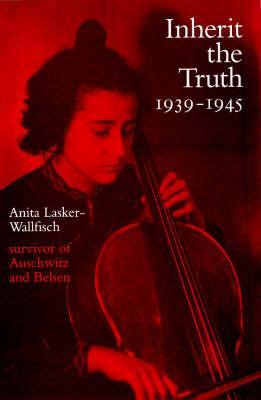Inherit the Truth 1939-1945

Inherit the Truth 1939-1945
In a sequence of family letters to her sister Marianne, who was marooned in England, from just before the war to 1942 when her parents were deported and liquidated, an atmosphere of happy normality gradually gives way to latent terror and foreboding. The appalling predicament of the Lasker family, and of Anita and Renate in particular when the rest of their relations had been deported and they were left totally alone in Breslau, could not be more poignantly conveyed. They were caught by the Gestapo trying to flee to Paris, and sent to prison: another piece of 'luck', as it turned out, since they were spared the worse horrors of Auschwitz for a crucial year. After the liberation of Belsen in April 1945, the correspondence with Marianne in England resumed. Anita was seconded to the British Army, and she quotes first-hand material about the early days of the occupation, including a transcript of part of the Luneburg trial in late 1945 when she gave evidence about Nazi atrocities at Auschwitz and Belsen, and was confronted in court by her tormentors. In 1946 she and Renate were both finally permitted to emigrate to England.
Three years later, Anita became a founder member of the English Chamber Orchestra, in which she continued to play the cello until recently. Anita's book featured in BBC Radio 4's 'Desert Island Discs' programme on 25th August 1996. She had also told her story in a series of f
PRP: 107.93 Lei
Acesta este Prețul Recomandat de Producător. Prețul de vânzare al produsului este afișat mai jos.
97.14Lei
97.14Lei
107.93 LeiLivrare in 2-4 saptamani
Descrierea produsului
In a sequence of family letters to her sister Marianne, who was marooned in England, from just before the war to 1942 when her parents were deported and liquidated, an atmosphere of happy normality gradually gives way to latent terror and foreboding. The appalling predicament of the Lasker family, and of Anita and Renate in particular when the rest of their relations had been deported and they were left totally alone in Breslau, could not be more poignantly conveyed. They were caught by the Gestapo trying to flee to Paris, and sent to prison: another piece of 'luck', as it turned out, since they were spared the worse horrors of Auschwitz for a crucial year. After the liberation of Belsen in April 1945, the correspondence with Marianne in England resumed. Anita was seconded to the British Army, and she quotes first-hand material about the early days of the occupation, including a transcript of part of the Luneburg trial in late 1945 when she gave evidence about Nazi atrocities at Auschwitz and Belsen, and was confronted in court by her tormentors. In 1946 she and Renate were both finally permitted to emigrate to England.
Three years later, Anita became a founder member of the English Chamber Orchestra, in which she continued to play the cello until recently. Anita's book featured in BBC Radio 4's 'Desert Island Discs' programme on 25th August 1996. She had also told her story in a series of f
Detaliile produsului













